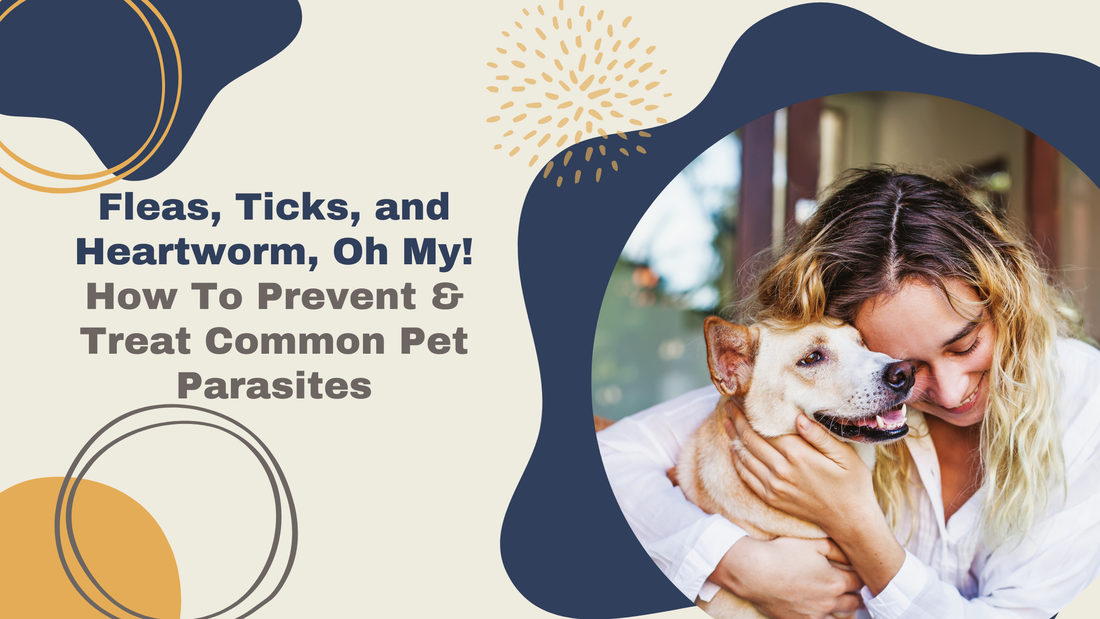|
With warmer weather right around the corner, many of us are looking forward to long hikes, camping trips, and summer backyard barbecues. But we’re not the only ones eager for summer. Warmer weather also means a resurgence of fleas, ticks, and other parasites throughout the US. Luckily, it’s easy to prevent and treat these common pet parasites, so you and your furry friends can enjoy a happy and healthy summer together.
Common Pet Parasites in Oregon Parasites are organisms that live in or on a “host” body, feeding off its resources and potentially causing harm. Many of the parasites that affect our pets can also be spread to or have a negative health impact on people. That’s why it’s especially important to have a prevention and treatment plan in place if you suspect your pet has been exposed. Some of the most common parasites we see at our clinic in Beaverton, Oregon include fleas, ticks, heartworm, and intestinal parasites. Fleas Fleas are tiny, blood-feeding parasites capable of jumping up to 13 inches in the air. That would be like the average person jumping over 1,000 feet! Fleas use their impressive jumping skills to leap onto hosts like pets, people, and wildlife. Signs of fleas include red bumps or pimples, constant itching or scratching, and dry skin or even hair loss. To check your pet for fleas, comb or brush your pet carefully, especially around the neck, belly, and inner legs. You may find adult fleas, which are small and brown and often move or jump when disturbed. You can also check for “flea dirt,” which looks like black pepper or grains of sand. Here in Oregon, where winters are mellow, fleas can survive year-round. This makes parasite prevention an important part of your pet’s wellness plan. If left untreated, a flea infestation could lead to serious infections, anemia, and other diseases. They also reproduce quickly! According to PetMD, “If you bring home just one adult female flea, in 60 days your home could be overrun by as many as 20,000 fleas!” Ticks Similar to fleas, ticks feed on the blood of humans and animals. Here in Oregon, they’re most active in the spring and early summer, but can also be found well into the fall. Most ticks live in wooded, brushy, or grassy areas, but they can also live in piles of backyard leaves or garden shrubs. They hunt by resting on the tips of grass or shrubs, waiting for a potential host (like a frolicking pup or unsuspecting hiker) to brush against their hiding spot. Once the tick climbs aboard the host, it finds a feeding spot and attaches itself for a blood meal that may last several days. During this time, small amounts of saliva from the tick may enter the host’s bloodstream. This is how disease spreads from ticks to humans and animals. Because ticks can secrete small amounts of saliva with anesthetic properties, most hosts don’t even know that the tick has attached itself! Because they can go undetected, it’s important to check yourself and your pets for ticks after outdoor summer activities. Brush your pets and inspect their skin thoroughly, especially behind the ears and between the toes, after each hike. Heartworm We’ve written at length about the dangers of heartworm and how to prevent the spread of heartworm disease. This dangerous disease is caused by a parasitic work, Dirofilaria immitis, which spreads through mosquito bites. Once a pet is infected, it takes up to six months for larvae to become mature adults. Once they mature they begin reproducing, causing damage to nearby blood vessels and reducing the heart’s ability to pump. Because most pets don’t show symptoms until their heartworm disease is severe, it may be a year or longer after the initial infection before you notice anything is wrong. If left untreated, heartworm is always fatal. When it comes to heartworm, prevention is the best way to protect your pet! Intestinal Parasites Intestinal parasites are parasitic worms that live in your pet’s gastrointestinal (GI) tract. Some of the most common types include roundworms, hookworms, whipworms, and tapeworms. Because they live in the GI tract, their larvae and eggs are passed through feces, which can spread the infection to nearby soil and water. Transmission could be as easy as your pup drinking from a contaminated puddle at the dog park or your child walking barefoot through contaminated soil. Symptoms of intestinal parasites depend on your pet’s age, general health status, and the type of parasite they’ve contracted. They’re most dangerous for puppies and kittens, animals with a chronic health condition, and older pets. But if left untreated, intestinal parasites can still be dangerous for healthy adult animals. Prevent and Treat Pet Parasites Beaverton, Oregon, like any other place, has a variety of parasites that can affect our pets. And our warm, humid summers increase the risk of flea and tick infestations during this time. Fortunately, protecting your pets from these common pet parasites is often as simple as a monthly preventative. Our recommendations include: For dogs:
For cats:
From fleas and ticks to heartworms and intestinal worms, these pesky parasites can cause serious health problems for pets. Luckily, prevention is a simple way to keep them happy and healthy. Through regular check-ups and annual lab work, we can give your furry family members the love and protection they deserve. Still have questions about parasite prevention? Get in touch to schedule an exam. Need a refill on your monthly preventatives? Order online through our convenient pet pharmacy. Comments are closed.
|
Contact Us
Mountainside Veterinary Hospital
www.mountainsidevets.com [email protected] Office: (971) 405 - 1111 Fax: (503) 498 - 5322 |
Hospital Location
15000 SW Barrows Rd. Ste. 101, Beaverton, OR 97007
|
Office Hours
Monday - Friday: 8:00a - 6:00p
Saturday: 8:00a - 4:00p Give us a call today to schedule your appointment! (971) 405-1111 |
Site powered by Weebly. Managed by IDEXX Laboratories


 RSS Feed
RSS Feed
